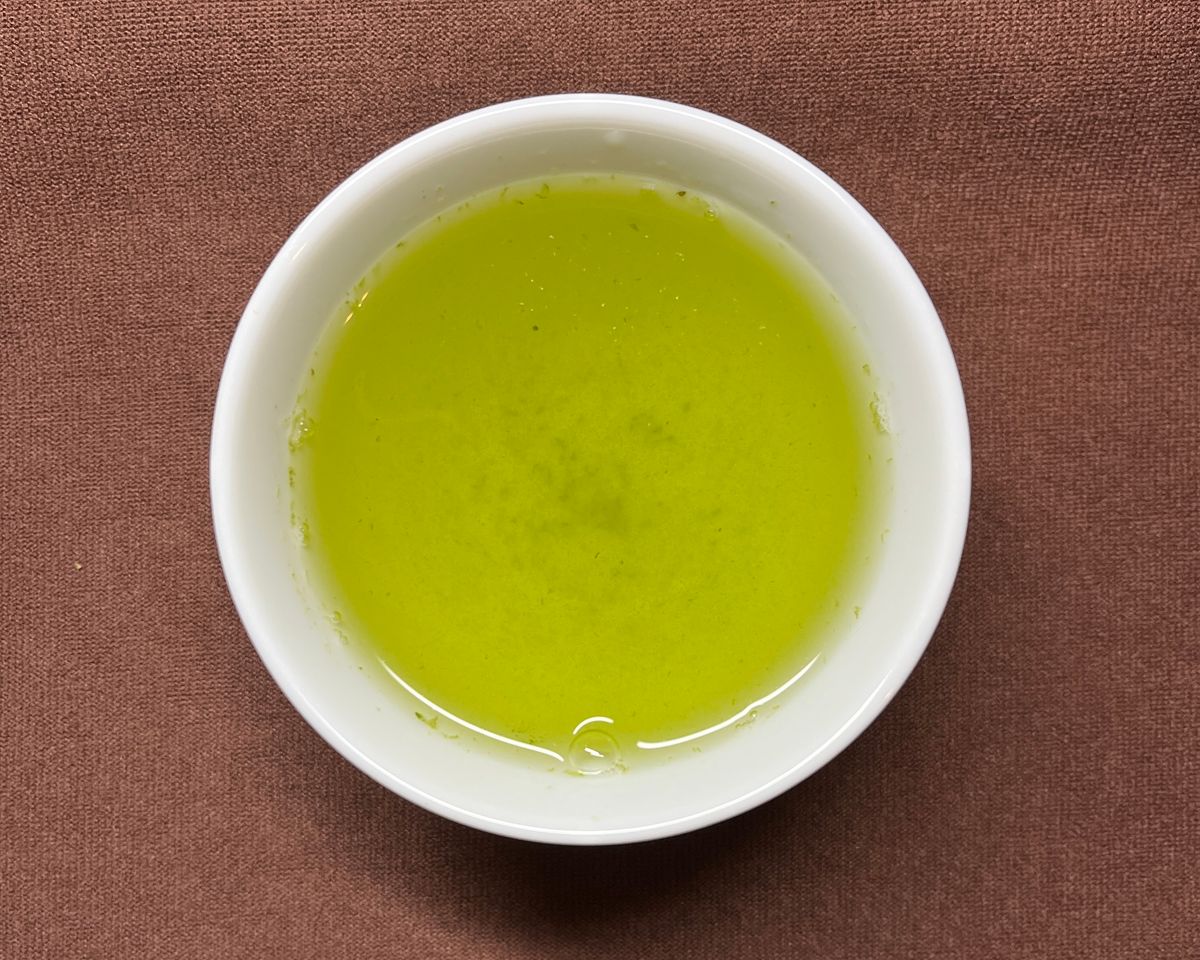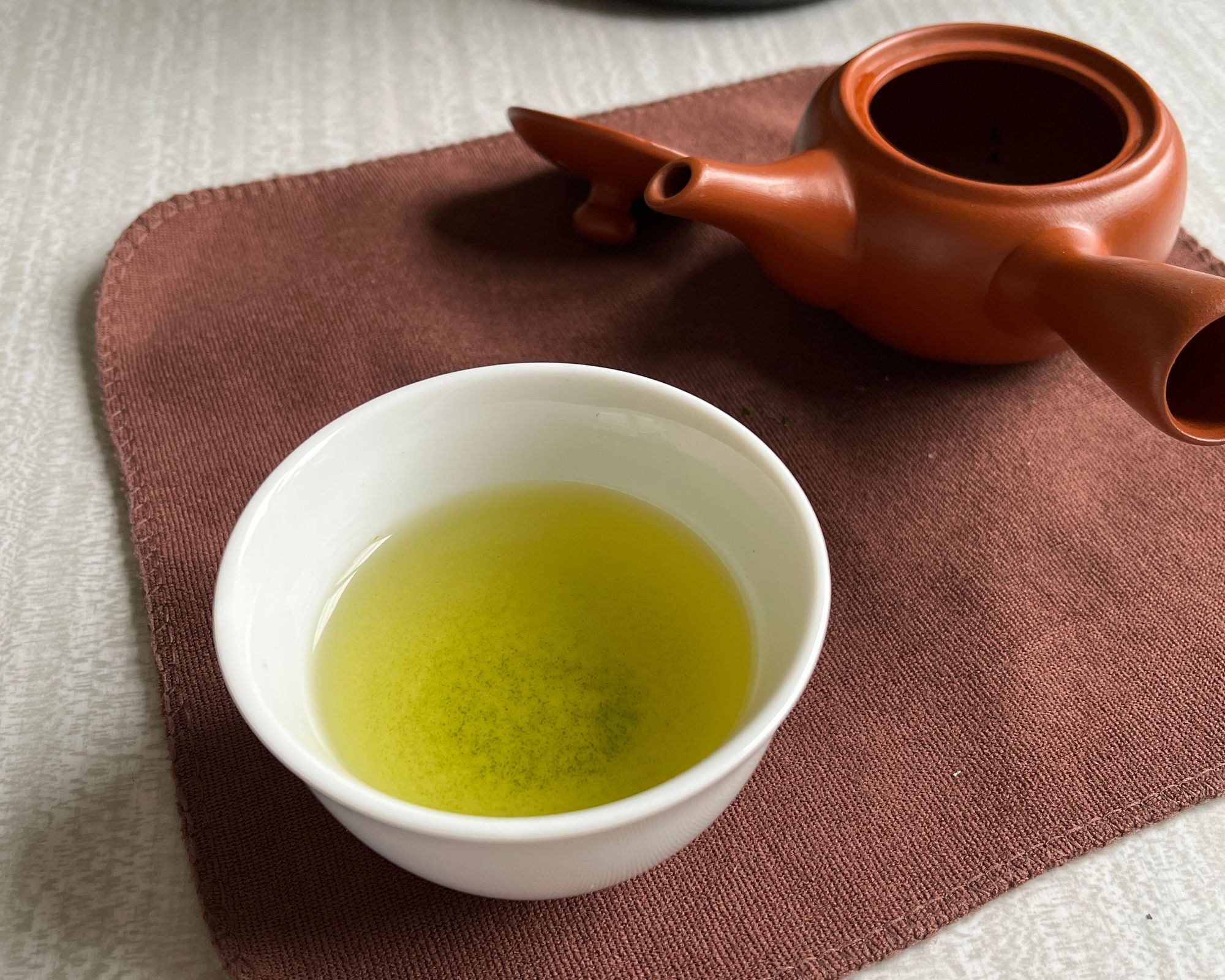Morning brew – Kabusecha Sueyoshi Seicha Kobo

Last week, I participated in the meet the farmer event from the Global Japanese Tea Association. That day, together with the farmer, we enjoyed two teas. Today I want to brew, again, one of them for this morning brew.
It has been a couple of very grey and rainy days here in Göteborg, with the rare appearance of the sun from time to time. It has taken some time since the last morning brew post. I have been at home recovering from a rib fissure accident earlier this year. This issue will be a bit different than me letting my mind wander and babbling around.
Today will brew a Kabusecha from Tatefumi Masaki, a farmer from Soo in Kagoshima. He operates with his father a family-owned operation, Sueyoshi Seicha Kobo.
First brew
The brew is clear, with a very light green, yellow tone. It surprised me when we drank this tea with Matakai-san and the other participants how balanced this tea was. And still is sweet, fresh and without overwhelming umami. The texture is thick and enjoyable. It leaves you with a sweet and refreshed palate.
It was fascinating to hear what Mataki-san had to say about it, too. He told us that this is his most balanced tea. We also asked him how big of an impact makes the different variables like soil, processing, cultivar etc. He singled the farm management, including soil management, pruning and other work around the farm, as the most impactful. Post-harvest processing and cultivar choice are key elements but not to the same degree.
I do not recall the specific things he told us about right now, but I would like to write about it in another post one day. I want to start with the project of evergreen notes for the blog. I will have our first one ready soon.
Second brew
The second brew is a much more bright green than before. Much more vibrant and a bit more aromatic as well. Never get tired of the smell of wet leaves. Fresh spinach, sweet aromas, such a pleasant smell.
The liquor is Smoot and sweet, gentle but distinguishable enough. Again, a balanced brew. It is just such a good tea, one of the best I have tried in a long time.

This is a Kabusecha shaded for around 2 weeks. Halfway in between a Sencha and a Gyokuro, this type of tea is what Mataki-san produces mainly. The shading is one of the main reasons the sweetness is more developed, and he also talked a bit more about that. Something, in particular, about the cultivar used, Saemidori. According to him, this cultivar is less astringent, and the content of Chlorophyll is also higher, which goes up a bit more when shaded. This is one of the main reasons for the bright green in the cup and the leaves.
This shows the care and intentionality in the process of this tea. And in all the other teas as well. But that is for another day. I am trying to remember more things explained during the event, and there were many. I want to talk about two in particular. But first, I will brew another cup last one left me wanting more.
Third brew
Some sweetness remains, like sweet beans, but the body is dropping. I can see the leafs fully open now in the small Kyusu I am using today. The smell is also less pronounced. As usual with this third brew, it is not as strong as the second one, which is usually for steamed teas. Nothing negative to say about the tea, a complete round experience. I cannot wait for the next time I brew this tea.
It is a special tea, and after the opportunity to meet and speak with the farmer, looking forward to meeting them in person one day.
Going back to other particular bits shared during the event. Let us talk about the volcano situation. Japan is known for its many natural disasters, earthquakes, typhoons, volcanos, the occasional tsunami alert due to earthquakes, etc. Kyushu island in the southern part of Japan is known for being a relatively calm area, but not for its volcanos.
The region has quite a few active volcanos, some of them going into action every two years or sometimes yearly, like the famous Sakurajima volcano. On the one hand, the ashes from the volcanos add nutrients to already rich volcanic soil in some areas. Beneficial for agricultural products. On the other hand, tea leaves cannot be processed with ashes mixed with them. This is why the farmers in the region have an extra step before processing where they rinse the leaves.
This could impact the final flavour, but the differences might not be significant enough. Nonetheless, I find it quite an interesting characteristic of the area. I had already heard about this when I watched the Tea Marathon videos. Mataki-san was present in one of them and explained the situation.
To end this morning brew session, I would like to transmit what Mataki-san told us about his farm. It is always nice to know more about the stories and origins of the different farms. But, it is different from hearing it directly from the farmers themselves and being able to ask them directly.
The farm was operated by a neighbour of Mataki’s grandfather. When the person decided to shut the operation, the grandfather bought the farm and the factory. It seems like the factory was originally built in another place as well. Since then, it has been operating by its family, where Mataki-san joined full-time six years ago after working as an accountant.
A particular characteristic of this farm is a field of around 70 years old Yabukita cultivars bushes. Perhaps the first ones planted in the region. I would be interested in seeing how tea from those develops, as they are quite old. Generally, I have heard that the bushes get renewed after 50 years of production. It could be nice to see if the quality holds. Or, as they explain, quality and amount decline after those many years. Never had the opportunity to taste tea from such old trees.
They are doing an outstanding job at the farm and cannot wait to try the new harvest in a few months, perhaps. I had the chance to exchange a few messages with Mataki-san after the event, and he has the ability to ship to Europe. I will buy some teas to enjoy until the new harvest comes in a few months and be able to compare and try teas that are currently sold out.
